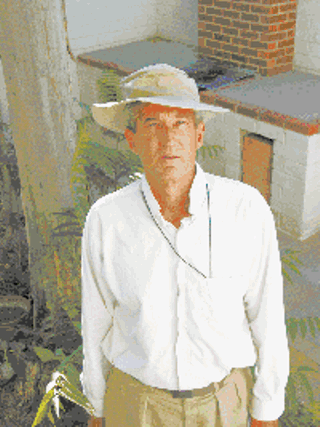Things got off to a shaky start ("Leave the Driving to Us," Jan. 22) as the Tucson City Council played volleyball with downtown's Greyhound bus station. First, there were plans to temporarily move it to Congress Street and Interstate 10, then the council tried to dump it near South Tucson; next, they decided they only wanted a permanent site, and they finally voted to go back to the original idea while considering a final building at Sixth and Toole avenues.
But the hopscotching may not be over, even if a temporary structure is slated to be installed near I-10 shortly after the Gem and Mineral Show in February. It could be another six months before the city's Transportation Department determines whether the bus station and the Ronstadt Transit Center can both be relocated to Sixth and Toole avenues, so stay tuned.
Possible revisions to Tucson's development regulations are also still pending. Last summer ("Varying Variances," July 29), the city was considering zoning code changes to encourage "better" design--a density-increasing proposal bitterly opposed by neighborhood representatives.
"They are definitely on hold," reports Sarah More, of the city's Department of Urban Planning and Design. "If they are revived, we'll definitely start over again."
The controversy over the Guzano Rojo establishment at Euclid Avenue and University Boulevard ("Neighborhood Bar," July 8) also became moot. Even though the adjacent homeowners constantly complained about unruly patrons, and the police became frequent visitors, the Arizona Liquor Control Board said there was nothing they could do. Despite that, the place shut down in August.
Bridget Werchan, who lives next door, describes the past few months as "wonderful," then adds, "If they (any future occupants of the building) are an honest-to-goodness restaurant that serves wine and beer by the glass, I'm fine with that. But if the customers go out and get smashed, I'm not in favor of that."
Some street maintenance employees of the city's Transportation Department may have wished for a beer or two after an article about goofing off on the job ("In a Rut," June 10). After publication of the article, city management went on a rampage. "They were really hot and hunting (for someone who was responsible)," sources reported. "They had meetings and were looking to hang someone."
Ignoring Brian Blank's satisfactory job evaluations, the Pima County government hit him with a surprise pink slip ("Brushed Off," June 3). Blank was fired from his wastewater inspector job, apparently because he spoke out at public meetings about Tucson air quality issues--on his own time.
After he appealed his dismissal, a county hearing officer told Blank: "It is far from clear that (Pima County) had reasonable cause to dismiss (you)." But the hearing officer also concluded that since Blank was still in training, he had no job security and thus could be fired without cause. Pointing to this paradox, Blank says, "I got fired for not finishing my training, but I couldn't finish it because I got fired."
David Larimore was canned from his Goodwill Industries job for yet another strange reason ("'Til Work Do Us Part," July 22). After he married a co-worker, the couple was told company policy mandated that one of them leave, even though their employee handbook didn't state that policy, and other Goodwills--such as the one in Phoenix--don't have that requirement.
After being laid off, Larimore ended up separated from his wife and living in his car. When last heard from, he had been successful in obtaining unemployment compensation, but also said, "My wife sent me a 'Dear John' letter."
The outcome of the Grant Road suicide lane issue ("Reversing the Reversible," April 15) was slightly more uplifting. The City Council voted to remove the dreaded traffic concoction, and while Jim Glock of the Tucson Department of Transportation reports increased congestion on the street, he adds that he has received more compliments than criticisms about the change.
A couple of projects near the UA haven't gone anywhere. A controversial high-rise housing development planned for Park Avenue just south of Speedway Boulevard ("Greater Gridlock," Jan. 15) was given preliminary approval by the City Council early in the year, but it hasn't proceeded further. According to architect Thomas Saylor-Brown, the use of the property on which the building was to be located has been complicated by Chase Bank's purchase of Bank One. Saylor-Brown says that the design of the building is being refined, and "until the paperwork with Chase is finalized, the project is on hold."
Two residences planned for the Jefferson Park neighborhood north of the university ("Density Discontent," May 20) are also in suspended animation. Over the objection of neighbors, developer Mike Teufel Jr. was ready to enlarge the existing home on a single-family zoned lot while also building another five-bedroom unit in back of it, but he so far has not. The existing house sits vacant, and Teufel says simply, "It's kind of on hold. I'm debating what to do."
Neighborhood association member Dyer Lytle hopes Teufel keeps the property single-family. He would also like to see the landscaping--which was stripped from the site--replaced. "It looks like a battle zone," he says.
Efforts to rent space in Tucson's historic train station ("Depot Development," March 18) were most successful. An ad agency and a gift shop now lease space, and a rug importer should be moving in shortly. Negotiations are also underway with a landscape architect office; if that happens, the only unleased space will be that designated for a restaurant.
An effort to confront one of Pima County's most glaring but underreported black eyes ("Addressing Hunger," Sept. 16) is also moving forward. During a summit attended by 150 people a few months ago, suggestions for real solutions, not just feel-good panaceas, were developed. On Jan. 13, a follow-up meeting will be held to decide what steps to take next.













